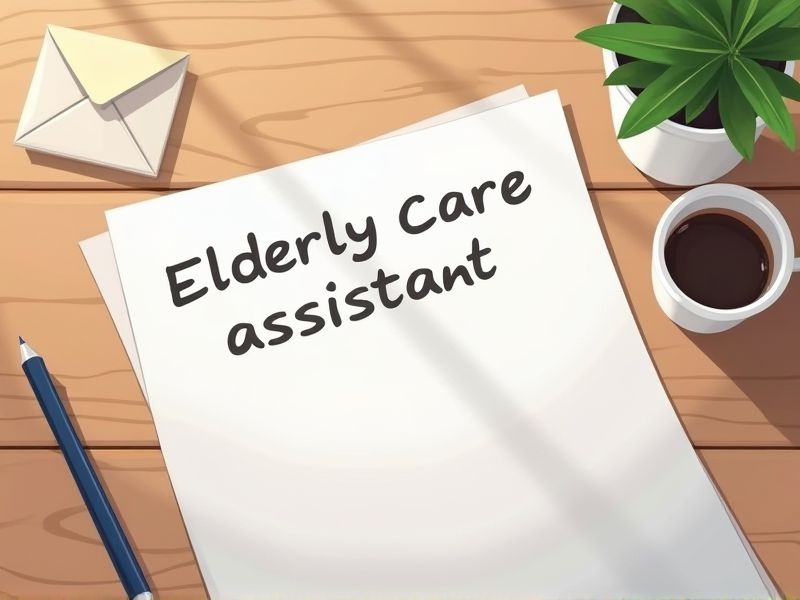
Elderly care assistants play a crucial role in supporting aging populations, necessitating proficiency in both health and safety. Certifications ensure that caregivers understand essential medical protocols and can handle emergencies with competence. These credentials also instill trust among families and enhance the quality of life for the elderly. Below are some key certifications you might require as an elderly care assistant.
Certified Nursing Assistant (CNA)
The growing aging population necessitates more hands-on care, increasing the demand for Certified Nursing Assistants (CNAs) in elderly care. CNAs provide essential daily living assistance, ensuring elderly individuals maintain their dignity and receive appropriate health monitoring. Their training equips them to identify changes in patients' health conditions, allowing for timely medical intervention. CNAs also serve as vital emotional support, reducing feelings of isolation and enhancing the quality of life for the elderly.
CPR and First Aid Certification
CPR and First Aid Certification equips elderly care assistants with essential skills to respond effectively to medical emergencies, such as heart attacks or falls, which are prevalent among the elderly. Certification ensures care assistants have up-to-date knowledge of life-saving procedures, increasing the likelihood of positive outcomes in emergency situations. Knowledge of first aid techniques helps in managing minor injuries or health issues, reducing the need for immediate hospital visits and ensuring continuity of care. Being certified can contribute to the elderly's overall well-being by fostering a safer living environment through preventive measures and the prompt, accurate reaction to health crises.
Home Health Aide (HHA) Certification
Home Health Aide (HHA) Certification ensures that caregivers have the essential skills and knowledge to meet the specific needs of the elderly safely and effectively. Certified aides are better equipped to monitor and manage patients' health conditions, which can prevent complications and improve outcomes. Certification elevates standards of care by providing a framework for ethical and professional conduct in home settings. This recognition builds trust with families, ensuring they can rely on trained professionals for their loved ones' care.
Medication Aide Certification
Medication Aide Certification provides elderly care assistants with the knowledge and skills needed to safely manage and administer medications, reducing the risk of medication errors. Certification ensures caregivers understand dosage requirements and potential side effects, improving patient outcomes and safety. Proper certification enhances trust between the care assistant, residents, and their families, fostering a secure caregiving environment. Regulatory compliance is often mandated by healthcare facilities, ensuring standardized practices in administering medication in elderly care settings.
Dementia Care Specialist Certification
Obtaining a Dementia Care Specialist Certification equips elderly care assistants with the skills necessary to understand and manage the complex behaviors associated with dementia. This specialized training enhances caregivers' ability to provide personalized care, ensuring the patient's safety and improving their quality of life. Certified specialists are more adept at recognizing early signs of dementia, which facilitates timely intervention and appropriate care strategies. Facilities often prefer certified professionals, as they can contribute to a higher standard of care and better outcomes for residents.
Elder Abuse Prevention Certification
Elder Abuse Prevention Certification ensures that elderly care assistants are equipped with the knowledge to identify and prevent harm towards seniors. Understanding the signs of abuse through certification leads to better protection and well-being of the elderly. Care facilities often demand certified individuals to ensure a standard of care that reduces the risk of mistreatment. The certification fosters trust between caregivers and families, ensuring loved ones receive the respectful care they deserve.
Palliative Care Certification
Palliative Care Certification enhances an elderly care assistant's ability to manage pain and alleviate symptoms in seniors with serious illnesses. This certification ensures that care assistants are equipped with the skills to provide emotional and psychological support to both patients and their families. It fosters a deeper understanding of end-of-life care, leading to improved quality of life for elderly patients. The certification also establishes a standard of excellence, which can boost the credibility and employability of care assistants within healthcare settings.
Infection Control Certification
Elderly individuals often have weakened immune systems, increasing susceptibility to infections, necessitating informed care approaches. Infection Control Certification equips elderly care assistants with knowledge about effectively preventing and managing infections. Proper training in infection control reduces the risk of disease transmission, ensuring a safer environment for both residents and staff. An informed workforce enhances the overall quality of care, aligning with regulatory standards and improving health outcomes in elderly care facilities.
HIPAA Compliance Training Certification
HIPAA Compliance Training Certification is needed for Elderly care assistants because it ensures they understand proper handling of sensitive patient information, which helps protect patient confidentiality. This training reduces the risk of data breaches and legal liabilities, safeguarding both the facility and the residents. Understanding HIPAA regulations enables staff to communicate appropriately with families and other healthcare professionals. Certified training also demonstrates a commitment to ethical standards, enhancing trust between caregivers, patients, and families.
Mental Health First Aid Certification
Elderly individuals often experience complex mental health challenges, such as depression or anxiety, which necessitates trained care assistants to identify and address these conditions. Mental Health First Aid Certification equips assistants with the skills to recognize early signs and symptoms, facilitating timely intervention. Effective mental health support can improve the overall well-being and quality of life for the elderly, reducing the risk of deterioration. As life expectancy increases, the demand for knowledgeable care providers in mental health awareness and support for the elderly population becomes critical.
Summary
When you, as an elderly care assistant, obtain certifications, your skill set will be significantly enhanced, contributing to better patient care. This advancement will likely lead to increased job satisfaction and career opportunities. Employers may view these certifications as a commitment to professional growth, potentially resulting in salary increases or promotions. The elderly individuals you care for might experience improved well-being due to your advanced expertise and updated knowledge.
